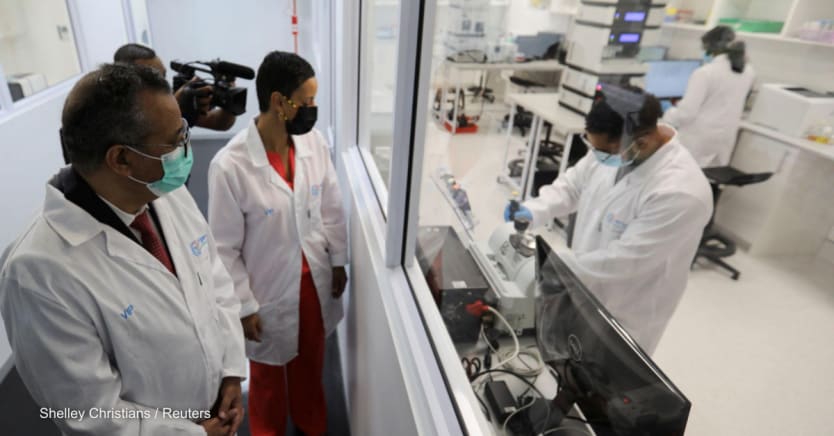
The World Health Organization announced the first six countries chosen to receive the tools needed to produce messenger RNA vaccines in Africa: Egypt, Kenya, Nigeria, Senegal, South Africa, and Tunisia.
The must-read weekly newsletter for exclusive global health news and insider insights.
These countries will receive training and technical know-how on how to produce this type of vaccine from the global mRNA technology transfer hub in Cape Town, South Africa, which was established last year with the aim of ramping up this type of vaccine manufacturing in low- and middle-income countries.
Globally, vaccine production is mainly concentrated in a few high-income countries, Dr. Tedros Adhanom Ghebreyesus, WHO director-general, said during a press conference on Friday. This has led to vast inequities in access to COVID-19 vaccines — more than 80% of the population of the African continent is yet to receive a single dose.
“No other event like the COVID-19 pandemic has shown that reliance on a few companies to supply global public goods is limiting, and dangerous. In the mid- to long-term, the best way to address health emergencies and reach universal health coverage is to significantly increase the capacity of all regions to manufacture the health products they need, with equitable access as their primary endpoint,” Tedros wrote in a press release.
“Full operationalization of the mRNA hub has been hampered by intellectual property barriers.”
— South African President Cyril Ramaphosa speaking during the media briefing on which countries are receiving mRNA technology from South Africa hubmRNA vaccines teach a body’s cells to make a protein that triggers an immune response. Currently, there are two mRNA vaccines approved for COVID-19: one from Moderna, and the other from Pfizer and BioNTech. But this type of technology can also be applied to a host of health problems.
“We expect the benefits of this initiative will extend far beyond COVID-19 by creating a platform for vaccines against other diseases, including malaria, tuberculosis, and even cancer. This is a strategic investment, not just for COVID, but for all the major health problems that we face,” Tedros said.
WHO will train the manufacturers in the six chosen African countries, and the Medicines Patent Pool will assist with the management of intellectual property and licensing.
Earlier this month, South Africa's Afrigen Biologics and Vaccines, a partner in the hub, announced it was successful in replicating Moderna’s vaccine by using publicly available information, without the company’s support. The hub chose to copy this vaccine because Moderna has committed to not enforce its patents during the pandemic.
Without the participation of outside companies, the hub will need to conduct new clinical trials for its vaccine candidate to gain approval. The clinical trials are expected to start in the fourth quarter of this year, with approval expected in 2024, Tedros said. This is a longer timeline than if an mRNA COVID-19 vaccine producer had decided to share the technical know-how on how to produce the vaccine.
“While the hub is undoubtedly an important initiative today and for future pandemic preparedness, the fastest way to start vaccine production in African countries and other regions with limited vaccine production is still through full and transparent transfer of vaccine know-how of already-approved mRNA technologies to able companies, with existing capacity that can be retrofitted to produce mRNA vaccines,” wrote Kate Stegeman, advocacy coordinator for Médecins Sans Frontières Access Campaign in the Africa region, in a press release.
“Full operationalization of the mRNA hub has been hampered by intellectual property barriers,” said South African President Cyril Ramaphosa during the media briefing. “Another challenge related to the IP barriers is the failure to transfer technology to the hub through nonexclusive licenses to produce, as well as to export and distribute the COVID-19 vaccines in low- and middle-income countries, including through the COVAX facility.”
He also said the lack of markets for vaccines produced in Africa “should be concerning to all of us,” and called on COVAX and Gavi, the Vaccine Alliance, the biggest buyers of vaccines in the world, to commit to buying vaccines from local manufacturers involved in the hub, instead of buying vaccines elsewhere, for distribution on the continent.
“We cannot continue being consumers of medical countermeasures for disease produced at high prices that are not affordable to our continent,” he said.
He also called on the swift approval of the TRIPS waiver, which would ensure that during the pandemic, intellectual property isn’t a barrier to access to COVID-19 health products. While many countries support this waiver, there are still some in opposition.

Search for articles
Most Read
- 1
- 2
- 3
- 4
- 5








